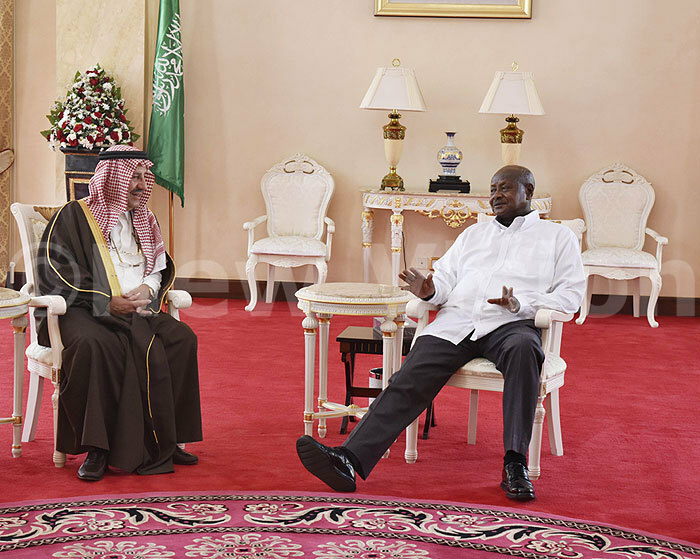What Museveni and Saudi prince discussed
Dec 08, 2016
“Uganda is currently the second biggest producer of bananas behind India but ours are organic and tasty bananas."

PIC: President Museveni hosted Prince Sultan Bin Mohammed Bin Saud Al Kabeer and his team at the State House on Wednesday. (Credit: Roderick Ahimbazwe)
ENTEBBE - President Yoweri Museveni on Wednesday received Prince Sultan Bin Mohammed Bin Saud Al Kabeer, a member of the House of Saud and chairperson of the board of directors Almarai Company.
He is in Uganda for a three-day working visit.
Museveni received Prince Sultan with his entourage comprising the Saudi ambassador to Uganda, Jamal Rafah, at State House Entebbe, before holding a one-hour meeting with his team.
Dressed in coffee-brown robes, white and a pink Keffiyeh (head dress), Prince Sultan was received at the steps of State House by the foreign affairs ministry protocol officials.
The prince was immediately ushered into State House's Credentials Room, where a jovial Museveni met him. For close to five minutes, Museveni and his guest talked about Uganda's beauty, especially its good climate.
"Are you sure you have a snow-capped mountain on the Equator?" Prince Sultan asked, after Museveni had told him about Mt. Rwenzori, which is one of the few places anywhere on the equator with snowcapped peaks.
The meeting between Museveni and Prince Sultan was aimed at the latter exploring investment opportunities in Uganda.

During the meeting, the President listed the possible areas for investment for the multi-billionaire businessman, including fruit-processing, manufacturing, textiles manufacture and grain milling.
"Uganda is currently the second biggest producer of bananas behind India but ours are organic and tasty bananas," Museveni noted.
"You can set up factories here to help with agro-processing."
The President offered the prince and his team a cluster of bogoya (yellow bananas). After eating two bananas, Prince Sultan, said: "These taste very nice. In Saudi Arabia, we import bananas from South America and the organic types are expensive."
President Museveni said Uganda was spending a lot of money on imports, citing China ($800m) and India (over $1b).
He said if factories were set up in Uganda to manufacture some of these imports, it would grow the local economy. The President said Uganda's population was growing and offered opportunity for investors.
"In 1962 at Independence, we were only 6.5 million. We are now 40 million people," Museveni said, adding that it not only provides adequate labour, but also offers market for products.

Drawing comparisons with India, President Museveni said: "India had 430 million people in 1962 and they are now 1.3 billion people and yet they are more prosperous than they were in 1962."
He said the Government was managing Uganda's population so that its growth (projected at 100 million people by 2050), delivers prosperity.
Prince Sultan expressed delight at being in Uganda and thanked President Museveni for the warm reception.
"We want to set up shop here. We want to help Uganda produce its products and avoid imports. People like products if they are of quality and locally-made."
"It benefits the local people more, creates for them jobs and strengthens the local currency since it avoids capital flight. It is what we want to do in Uganda."
Citing countries in the Middle East such as Iraq, Yemen and Syria, which have been blighted by ruinous civil wars, Prince Sultan noted that Uganda is increasingly becoming an attractive destination for investors because of the good weather, fresh water and most importantly, peace and security.
Prince Sultan, who is ranked as the 12th richest man in the Middle East worth $2.6b by Forbes Magazine, will tour the President's farms in Kisozi and Rwakitura, Jesa Farm, several tourist sites and also attend a business forum in Kampala, before departing on Saturday.
